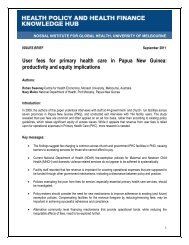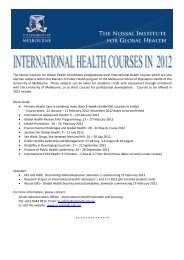AN INTRODUCTION TO MENTAL HEALTH - The Nossal Institute for ...
AN INTRODUCTION TO MENTAL HEALTH - The Nossal Institute for ...
AN INTRODUCTION TO MENTAL HEALTH - The Nossal Institute for ...
Create successful ePaper yourself
Turn your PDF publications into a flip-book with our unique Google optimized e-Paper software.
Step 2 – Case study and group work: the symptoms<br />
Divide the participants into four groups.<br />
Ask each group to identify a member of the group who will make notes to<br />
feed back to the whole group at the end of this activity.<br />
Each group is given one of the four Case studies (A, B, C & D).<br />
NB: <strong>The</strong> first three case studies (A, B & C) have previously been discussed<br />
(see Activities 5 and 6 above), but Case study D will be unfamiliar to<br />
the group.<br />
Case study D<br />
Manik is a 31 year old woman whose husband is worried because she has<br />
started behaving in an unusual manner. She is sleeping much less than usual<br />
and is constantly on the move. Manik has stopped looking after the house<br />
and children as efficiently as be<strong>for</strong>e. She is talking much more than normal<br />
and often says things that are unreal and grand e.g. that she can heal other<br />
people and that she comes from a very wealthy family (even though her<br />
husband is a farmer). She has also been spending all their money on things<br />
they can not af<strong>for</strong>d. When Manik’s husband tries to bring her to the clinic she<br />
becomes angry and irritable.<br />
Note <strong>for</strong> the facilitator: Manik is experiencing the following symptoms of a Severe Mental<br />
Disorder:<br />
Physical symptoms – not sleeping<br />
Emotional symptoms – irritability, anger<br />
Behavioural symptoms – restlessness, excessive talking, spending a lot of money<br />
Imagining symptoms – saying that she can heal others and that she comes from a wealthy<br />
family (when she does not).<br />
Manik is possibly experiencing a manic phase of Bipolar Disorder.<br />
Ask the groups to think of as many ways as possible of responding to the<br />
person in their case study using the steps in the MHFA action plan.<br />
Allow 20 minutes <strong>for</strong> this task.<br />
Ask each group to present their work to the rest of the participants,<br />
mentioning the following:<br />
• <strong>The</strong> symptoms experienced by the person in the case study.<br />
• What they would do to help the person.<br />
50<br />
<strong>AN</strong> <strong>INTRODUCTION</strong> <strong>TO</strong> <strong>MENTAL</strong> <strong>HEALTH</strong>
















